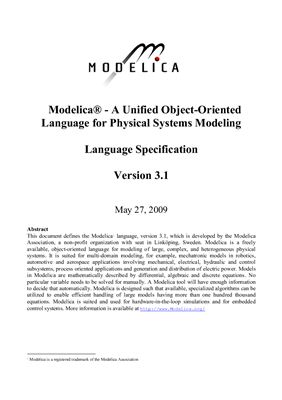Modelica® - A Unified Object-Oriented Language for Physical Systems
Modeling Language Specification, Version 3.1 May 27, 2009 , 236
pages.
Abstract
This document defines the Modelica1 language, version 3.1, which is developed by the Modelica
Association, a non-profit organization with seat in Link?ping, Sweden. Modelica is a freely
available, object-oriented language for modeling of large, complex, and heterogeneous physical
systems. It is suited for multi-domain modeling, for example, mechatronic models in robotics,
automotive and aerospace applications involving mechanical, electrical, hydraulic and control
subsystems, process oriented applications and generation and distribution of electric power. Models
in Modelica are mathematically described by differential, algebraic and discrete equations. No
particular variable needs to be solved for manually. A Modelica tool will have enough information
to decide that automatically. Modelica is designed such that available, specialized algorithms can be
utilized to enable efficient handling of large models having more than one hundred thousand
equations. Modelica is suited and used for hardware-in-the-loop simulations and for embedded
control systems. More information is available at http://www.Modelica.org/
Abstract
This document defines the Modelica1 language, version 3.1, which is developed by the Modelica
Association, a non-profit organization with seat in Link?ping, Sweden. Modelica is a freely
available, object-oriented language for modeling of large, complex, and heterogeneous physical
systems. It is suited for multi-domain modeling, for example, mechatronic models in robotics,
automotive and aerospace applications involving mechanical, electrical, hydraulic and control
subsystems, process oriented applications and generation and distribution of electric power. Models
in Modelica are mathematically described by differential, algebraic and discrete equations. No
particular variable needs to be solved for manually. A Modelica tool will have enough information
to decide that automatically. Modelica is designed such that available, specialized algorithms can be
utilized to enable efficient handling of large models having more than one hundred thousand
equations. Modelica is suited and used for hardware-in-the-loop simulations and for embedded
control systems. More information is available at http://www.Modelica.org/

